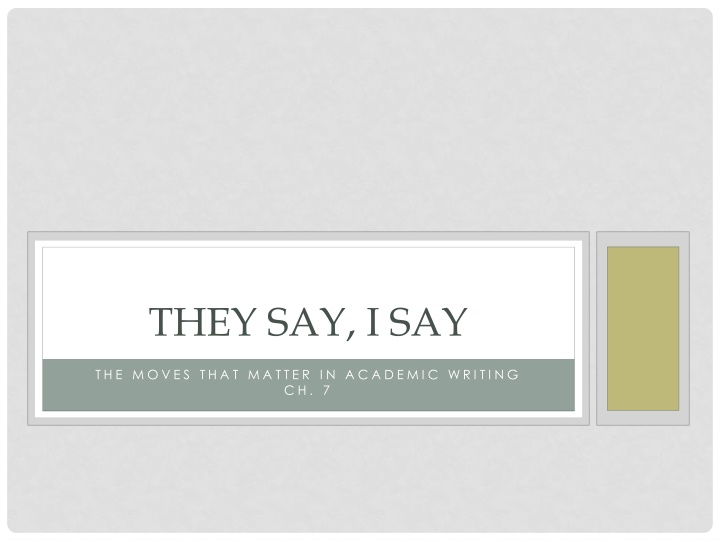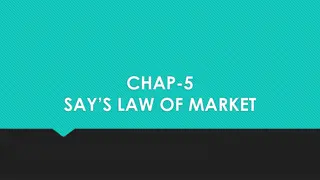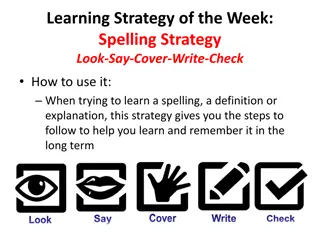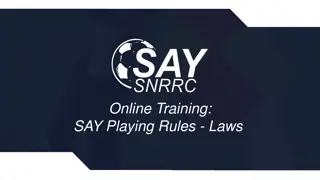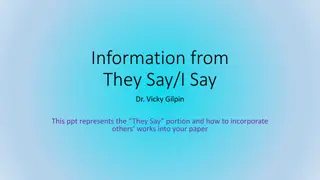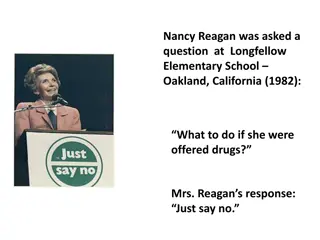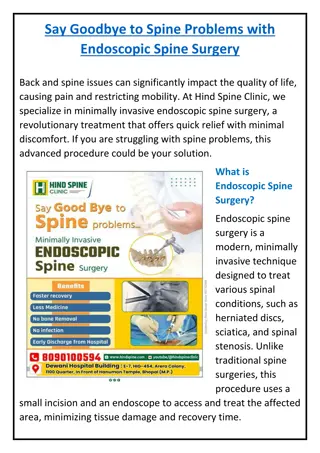THEY SAY, I SAY
Our authors emphasize the importance of addressing the question "So what? Who cares?" in academic writing. Failing to show why your argument matters can lead to losing your audience. Examples are provided to illustrate the significance of stating why the argument is relevant and who cares about it. Templates for indicating who cares are also discussed, highlighting the necessity of framing your claims and acknowledging the stakeholders involved. The content stresses the critical aspect of engaging readers by explaining the relevance and importance of your writing.
Download Presentation

Please find below an Image/Link to download the presentation.
The content on the website is provided AS IS for your information and personal use only. It may not be sold, licensed, or shared on other websites without obtaining consent from the author.If you encounter any issues during the download, it is possible that the publisher has removed the file from their server.
You are allowed to download the files provided on this website for personal or commercial use, subject to the condition that they are used lawfully. All files are the property of their respective owners.
The content on the website is provided AS IS for your information and personal use only. It may not be sold, licensed, or shared on other websites without obtaining consent from the author.
E N D
Presentation Transcript
THEY SAY, I SAY T H E M O V E S T H A T M A T T E R I N A C A D E M I C WR I T I N G C H . 7
CH. 7: SO WHAT? WHO CARES? SAYING WHY IT MATTERS Our authors begin this chapter by saying Baseball is the national pastime. Bernini was the best sculptor of the baroque period. All writing is controversial. So what? Who cares? Why does it matter? (92). Readers always need to know why they should care, they need to know what is at stake, why they should keep reading at all.
WHY Because all too often the question is never answered. Someone brings it up, talks about it, but never attempts to answer it. Crucial Question: Why does your argument matter? Failing to show a reader that they should care can cause you to lose your audience
WHO CARES? Answering the Who cares? question, example: Scientists used to think body fat and the cells it was made of were pretty much inert, just an oily storage compartment. But within the past decade research has shown that fat cells act like chemical factories and that body fat is potent stuff: a highly active tissue that scretes hormones and other substances with profound and sometimes harmful effects In recent years, biologists have begun calling fat an endocrine organ, comparing it to glands like the thyroid and pituitary, which also release hormones straight into the bloodstream. - Denise Grady, The Secret Life of a Potent Cell
EXPLANATION 1. There is a clear claim 2. Framing of that claim 3. Identifies at least one group at stake (scientists) 4. Gives credit to a larger conversation
TEMPLATES FOR INDICATING WHO CARES To address who cares? questions in your own writing Parents used to think spanking was necessary. But recently [or within the past few decades] experts suggest that it can be counterproductive. This interpretation challenges the work of those critics who have long assumed . These findings challenge the work of earlier researchers, who tended to assume that . Recent studies like these shed light on studies had not addressed. , which previous
MORE Grady could have been more explicit in her who cares? by being more direct: But who really cares? Who besides me and a handful of recent researchers has a stake in these claims? At the very least, the researchers who formerly believed To gain greater authority as a writer, you may wish to state groups and others who have a stake in what you say: Researchers have long assumed that scholar of cell biology, , assumed in cell structures and functions, that fat cells it, (2007). Another leading scientist, cells (2006). Ultimately, when it came to the nature of fat the basic assumption was that But a new body of research shows that fat cells are far more complex and that . should care. . For instance, one eminent , her seminal work on . As , argued that fat herself put .
IN OTHER CASES You may wish to refer to groups and individuals who should care: If sports enthusiasts stopped to think about it, many of them might simply assume that the most successful athletes new research shows . . However, These findings challenge neoliberals common assumption that . At first glance, teenagers might say inspection . But on closer . Remember, the goal in all of this is to set up a contrast between what others are saying and what you are saying.
SO WHAT? Sometimes answering who cares? is not enough, especially for a general audience. Thinking of Grady s argument, some may still ask why they should really want to know that The authors note that The best way to answer such questions about the larger consequences of your claims is to appeal to something that your audience already figures to care about (97).
DIFFERENCE IN THE QUESTIONS Asking who cares? wants to point to and identify interested persons and groups surrounding the topic Asking so what? directs you to link your argument to some larger matter that readers already deem important (97). Who cares? = those who would want to hear your argument So What? = connecting your argument to the values and concerns of your audience
HOW IT WORKS.. Looking at Grady s argument again, she moves first link researchers interest to a general concern, the who cares? : Researchers trying to decipher the biology of fat cells hope to find new ways to help people get rid of excess fat or, at least, prevent obesity from destroying their health. In an increasingly obese world, their efforts have taken on added importance. (97) Next, Grady moves to demonstrate the even broader relevance and urgency of her subject matter (97): Internationally, more than a billion people are overweight. Obesity and two illnesses linked to it, heart disease and high blood pressure, are on the World Health Organization s list of the top 10 global health risks. In the United States, 65 percent of adults weigh too much, compared with about 56 percent a decade ago, and government researchers blame obesity for at least 300,000 deaths a year. (97-8)
EXPLAINED We need to be asking questions, researchers are, and we need to pay attention to this issue because it s a problem more and more people are having to deal with Look at her use of the phrase: in an increasingly This is adapted into her so what? move world . The aim is the need to justify the importance of one s concerns is common for any argument (98).
TEMPLATES FOR ESTABLISHING WHY YOUR CLAIM MATTERS Huckleberry Finn matters/is important because it is one the most widely taught novels in the American school system. Although X may seem trivial, it is in fact crucial in terms of today s concern over . Ultimately, what is at stake here is . These findings have important implications for the broader domain of . If we are right about . , then major consequences follow for These conclusions/This discovery will have significant applications in as well as in .
COMBINING THE SO WHAT? WITH THE WHO CARES? Although C may seem of concern to only a small group of , it should in fact concern anyone who cares about .
WHAT ABOUT READERS WHO ALREADY KNOW WHY IT MATTERS? Do you really need to answer who cares? and so what? in everything you write (99). Well, it is if you re proposing something so obviously consequential as, say, a treatment for autism or a program to eliminate illiteracy? Isn t it obvious that everyone cares about such problems? Does it really need to be spelled out? (99-100) The general rule is: YES Try to go as far as possible to answer the questions don t assume things about your audience
CH. 7 - EXERCISES Look over something you have written yourself. Do you indicate so what? and who cares ? If you do, share a brief statement of it. If not, revise your text to do so. You might use the following templates to get started: My point here (that Beyond this limited audience, however, my point should speak to anyone who cares about the larger issue of ) should interest those who . .
